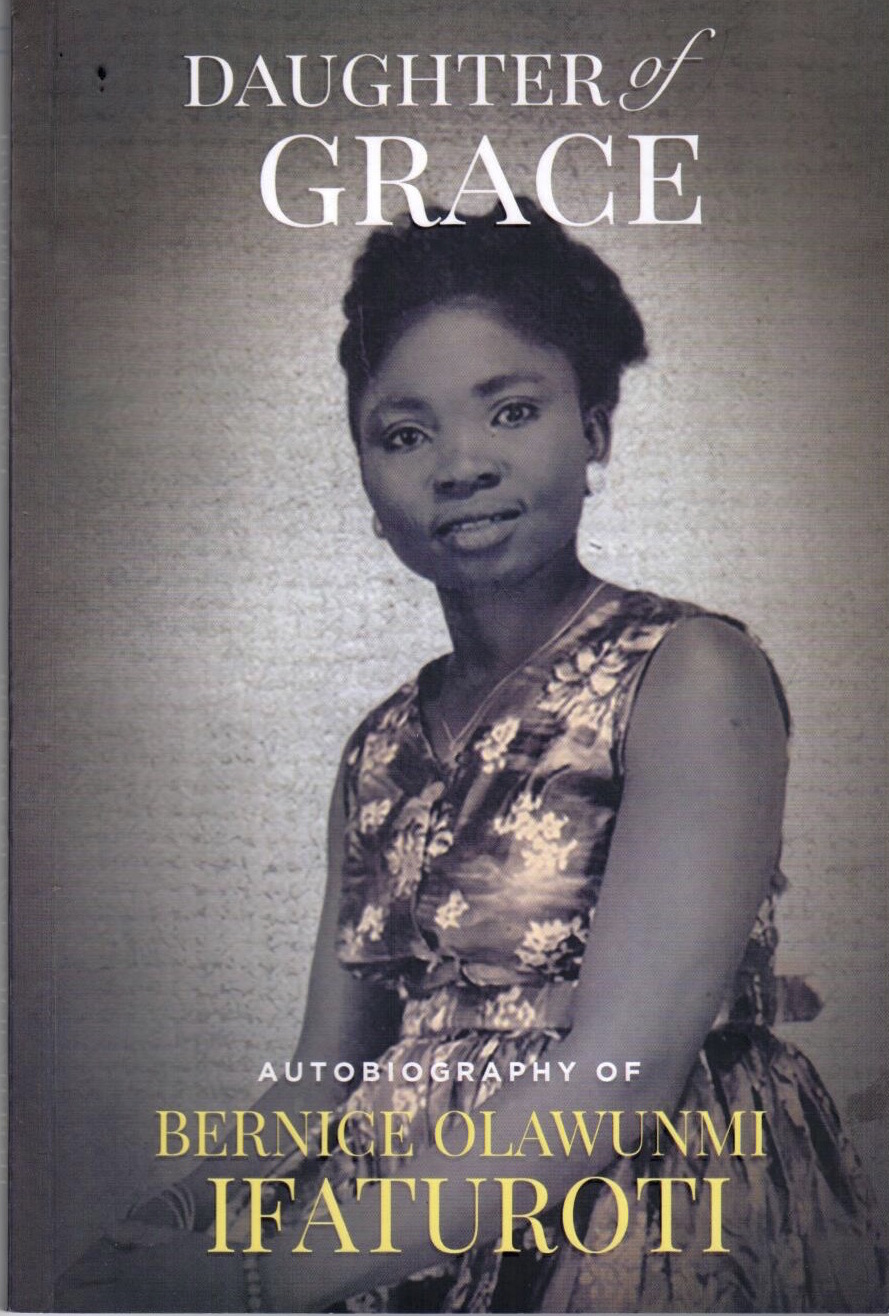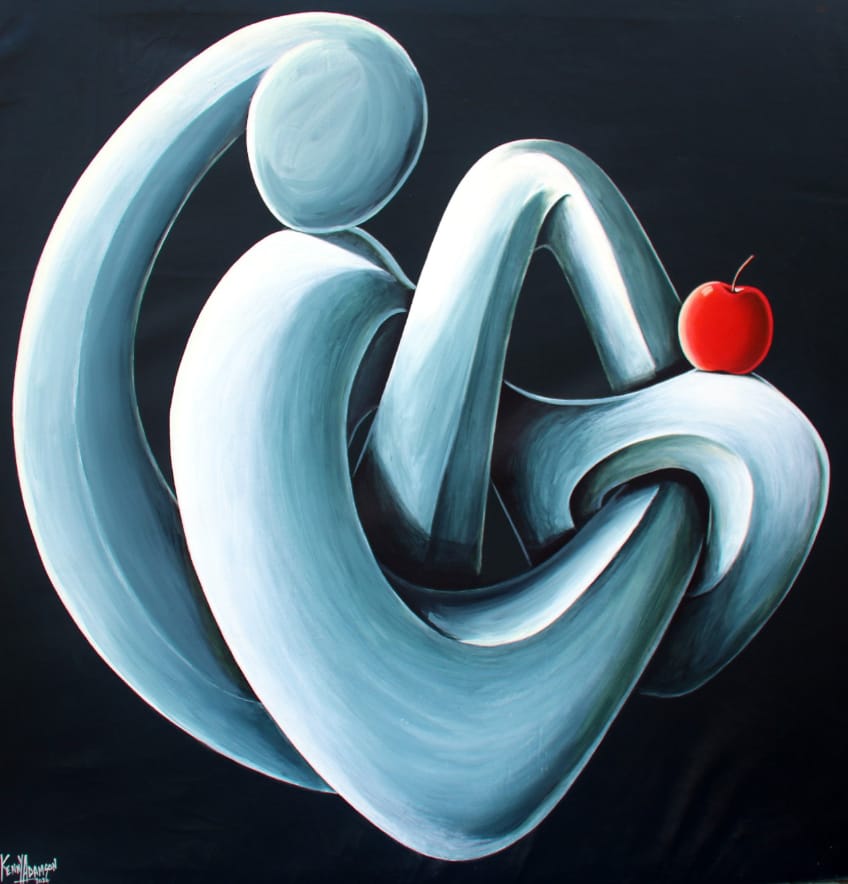Title: Daughter of Grace
Author: Bernice Olawunmi Ifaturoti
Year of Publication: 2022
Reviewer: Yomi Layinka
Daughter of Grace is the autobiography of Assistant Pastor Bernice Ifaturoti, JP. It is dedicated to her late husband, Peter Adeyeye Ifaturoti, who, according to the author, “showered me with so much love I have enough to share with those around me.”
Written within the covers of a modest 130 pages, it contains 10 short but truly engaging chapters, starting with the one in which she describes her very remarkable experience as an 84-year-old involved in a scary surgical operation that could have gone very wrong. Thankfully, it didn’t.

She goes on to regale the reader with recollections of her birth, school years and the unforgettably soft memories of her Prince Charming, who departed from her, just when their flowers were blossoming.
She caps it up with stories about her ‘Pauline conversion’ in 1990 and the Redeemed Years during which she met Jesus Christ anew; about how she got hooked on Him until she became a worker in His vineyard where she still serves today as an assistant pastor at 90!
This remarkable example of amazing commitment to the service of God and humanity underscores the fact that it is never too late to be called to serve God. The book gracefully winds down with recollections of how she became a Jerusalem Pilgrim and her random thoughts on life and living, widowhood and the everlasting life of purpose.
Chapter two deals with her parentage and her multiple cultural roots — both animist and Christian – in Ilesa, Western Nigeria. It details the polygamous setting of her childhood and speaks to the intriguing hierarchies of relationships, especially between her father’s nine wives and his 23 offspring.
This draws comparative parallels with contemporary realities in which monogamy seems to privilege possessiveness over community sharing. The way she describes it in approving terms, that era of shared love and forbearance, is a rebuke to today’s culture of individualism and the dwindling demonstration of love and mutual respect, even among families and siblings of the same mother.
Her narrative also spoke to the unusual liberal attitude of her late father, Pa Benjamin Olubode Fagbemi, who demonstrated an uncanny love for his children’s education in an era when schooling was still a rarity, especially for the girl child. Yet, he allowed all 23 of his children to go to school notwithstanding their sex nor the hierarchy of their mothers.
This chapter also evokes the general state of the Ilesa community as it records aspects of pre-independence Nigeria. It recalls the wholesome nature of the education that children received in those days and the instructional use to which folktales were deployed.
She longingly remembers one of the most legendary dramatis personae of those folk stories, Ijapa, the ubiquitous and cunning tortoise whose conniving wife was Yannibo. She reminds the reader of the simple yet impactful lessons derived from those folksy constructions and of the songs and responses between the adult storytellers who led the songs; and their giddy audiences of impressionable little children who enthusiastically chorused in return.
Some of the popular Yoruba folk songs of that era later made their way into popular imagination through the works of musical artistes like Fela, Tunji Oyelana and Jimi Solanke, among many others.
Towards the end of that second chapter, she wrote very proudly about ‘Brother John’, her elder brother, who was admitted on full scholarship in 1944, into the famous Government College, Ibadan; from where he became (along with the likes of Chinua Achebe and Mabel Segun) one of the pioneer students of the University College, Ibadan in 1948.
He was later admitted into Cambridge University for his graduate studies before returning home to become Nigeria’s first Professor of Computer Science.
But was he the first professor of computer science in Nigeria? My personally long-held view was that the distinction belonged to the late Prof. Olu Longe of the University of Ibadan. This belief was supported by several Internet searches where I have read and heard the same version of that history until my recent reading of Mama Ifaturoti’s book, in which she claimed the same feat for her late brother.
Not sure of what to believe, I googled it up again and initially found the same, old results crediting late Prof Olu Alonge — until I stumbled on a 2001 inaugural lecture at the University of Lagos by another professor of computer science, Prof J.O.A. Ayeni. Towards the end of the lecture entitled “Computing Culture: the State of The Nation”, he requested the indulgence of the Vice Chancellor to acknowledge a few of the notable people who had contributed to making him what he had become.
Apart from the typical acknowledgement of God and family, the very next person he offered credit to was a certain Prof. Olasupo J. Fagbemi. According to him, “One person I believe God used to drag me into computing is the first professor of computer science in Nigeria, late Prof Olasupo J. Fagbemi”. It would appear then that our author, Mrs Bernice Ifaturoti, is on firm grounds having been supported in her claims by no less a subject matter authority than a professor of computer science himself!
In chapter three, “Bernice goes to school”: As the earlier story of ‘Brother John’ demonstrated, Pa Fagbemi was a lover of education who did his best to give his children opportunities without discrimination against or in favour of any set of children or their gender. Young Bernice would end up in a teacher training college after which she began a long teaching career that lasted 33-and-a-half years. Like her brother, John, mathematics was her favourite subject, which she taught with gusto over those decades in several cities like Onitsha, Benin, Ibadan, Ile Ife and Lagos where she spent her longest teaching years.
Then, we get to read the story of how she met Prince Charming. Starting from page 24, our author wrote of the first time she set her eyes on this handsome and charming prince, who was from one of Ilesa’s ruling houses when she was barely 14 years of age; of how “he greeted me and I greeted him”; of how his relentless pursuit of love over the next nine years eventually culminated into her marriage into royalty on October 17, 1955. The blissful marriage was to last another 34 years before her prince charming left her in limbo in 1989. Before he transitioned into eternity, however, the couple had had six beautiful and wonderful children — three boys and three girls – a full quiver of arrows indeed!
In this book of recollections, I found a very short but interesting story of “The Gold Thief” on page 40. It recounted the day when “Ojuole” came visiting the Ifaturotis. The tale concludes by drawing a parallel between the tragic end of the suspected gold thief and a long-held superstition about how according to her, “gold thieves almost always ended their lives in the fire!”
Between pages 57 and 80, the reader is introduced (through an array of spectacular and intimate family portraits) to the generation that begat Bernice, her marriage and times with Prince Charming as well as the joyful moments with their six children, grandchildren and great-grandchildren.
In chapter 6, which is titled “Yeye: Tragic Exit”, we read of how a day started as usual at about 5 am only to end up as the most devastating day she had ever, ever experienced. After the normal morning chores of preparing an early breakfast for her husband whom she lovingly referred to as the Lord of the Manor, he was gone to work at exactly 7 am. When he phoned at lunch break, as he was wont to, his closing words were, “I’ll be seeing you later”. She has been waiting for his return for 33 long years … How he left her with six young children in such a truly dramatic manner is a story that fills the heart with pathos.
Chapter 7 tells of how “Easter 1990” led to the author’s 32 years continuing sojourn at the Redeemed Christian Church of God (RCCG); of how RCCG was God’s instrument to shape her new life, up from the pains and sorrows of the passage of her darling husband; of how she eventually became part of the Church’s team of church planters; of how she attended Bible school and eventually got ordained in 2005 as an assistant pastor.
In the eighth chapter of the Daughter of Grace, we follow the author — as a Jerusalem Pilgrim — through her truly remarkable 2013 experience of walking the exact same path that Jesus walked in his lifetime including his birthplace, the Golgotha where he was crucified and the site of His empty tomb after He had risen. Perhaps even more uplifting was the experience of being baptized in the same River Jordan where the Lord Jesus himself was baptized over 2000 years ago.
In the penultimate chapter, the author shares with us her considered thoughts on sundry issues of life and afterlife; of widowhood and imperatives of trusting in the Lord; of living a life that is sanctified unto the Lord; of patriotism and the importance of obeying the righteous laws of the nation; and above all: of making God our everlasting Father!
This heartfelt book ends with a 10th chapter, which is a compilation of lovingly written tributes from the nonagenarian’s children, her grandchildren and their own grandchildren on the occasion of her ninetieth birthday celebration.
For me, the ultimate value of this book is not so much about what it has to say (although it packs more than a punch in what it says about the remarkable character and events that surround this woman of resilience and faith), neither is it in how it says it (even if she undoubtedly does so in a refreshingly comprehensible and elegant style befitting of a lady of poise and discretion).
The more enduring value lies in telling it all. The fact that a 90-year-old would deem it important enough at the twilight of her years to tell her story and those of some characters and epochs she was a central part of is not only a huge service to the nation but indeed a significant contribution to redressing a global black history challenge.
In this respect, we must recall and recognize the racial slur that Africans have long suffered by their characterisation as a race, which treats history (especially it’s own) with cavalier and ignominious inattentiveness. We have long suffered from the embarrassing profile of a people credited with little or nothing significant to humanity’s march of civilisation – all because we have not learnt (like our white counterparts) to diarise and document every little instance of our work and contributions. Nor have we learnt to tell and document our stories in permanent forms, like writing autobiographies and telling heroic stories of our people and epochs.
I, therefore, salute the commitment of our author to this truly important effort of documenting her story and those of her family, notwithstanding the strenuous demands the exercise must have demanded of her understandably ageing faculties.
Although she is not a wordsmith with the lilting grace and historical perspicuity of a Flora Nwapa nor is she possessed of the literary dexterity and syntactic powers of a Wole Soyinka, she nonetheless writes with a fetching felicity and graciousness that endears the reader into the sublime world of her candidly told stories; and encounters with fate and fortune as well as the dramatic and memorable moment she joyfully recounts in the course of her ninety eventful years on this side of eternity.
To conclude, let me quote this paragraph from the foreword written by her son, Femi who is my friend, Sheriff: “To the reader, you have in your hands a rare treasure, rich in old-fashioned anecdotes and historical facts. I guarantee you that, with the turn of every page, your perspective on what constitutes a wholesome life will be enriched.” You can take Femi’s words for it.
Here is wishing the matriarch of the family of the late Prince Peter Adeyeye Ifaturoti a very happy 90th Birthday! Mummy, you are indeed a daughter of grace!






